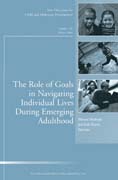
The role of goals in navigating individual lives during emerging adulthood n. 130, winter
1. Understanding Emerging Adulthood from a Goal-Setting Perspective (Shmuel Shulman, Jari-Erik Nurmi). In this introductory chapter, the authors describe the role of goal setting and aspirations in individual development during emerging adult- hood and discuss ways in which goal processes affect individual trajectories and outcomes. 2. Personal Goals and Well-Being: How Do Young People Navigate Their Lives? (Katariina Salmela-Aro).The author addresses the role ofpersonal goals to well-being from adolescence to emerging adulthood. 3. GoalAttainment, Goal Striving, and Well-Being During the 27 Transition to Adulthood: A Ten-Year U.S. National Longitudinal Study (Emily E. Messersmith, John E.Schulenberg). The authors analyze longitudinal relations between goal striving, goal completion, well-being, and self-efficacy during the transition to adulthood. 4. “Holding On” or “Coming to Terms” with Educational Underachievement: A Longitudinal Study of Ambition and Attainment (Mayumi Uno, Jeylan T. Mortimer, Minzee Kim, Michael Vuolo). The family of origin and early occupational experiences influence young adults’ propensity to maintain or give up on earlier, yet unrealized, aspirations to graduate from college. 5. Dynamics of GoalPursuit and Personality Make-Up Among Emerging Adults: Typology, Change over Time, and Adaptation (Shmuel Shulman, Jari-Erik Nurmi). The authors show that the capability of setting realistic work and love goals during emerging adulthood reflects inner strengths and is associ- ated with adaptive outcomes. 6. Models of Developmental Regulation in Emerging Adulthood and Links to Symptomatology (Christian Skaletz, Inge Seiffge-Krenke). Based on a longitudinal study,different models of developmental regulation are tested in a sample of Germanemerging adults and are linked to indicators of psychological well-being. 7.Finding the Authentic Self in a Communal Culture: Developmental Goals in Emerging Adulthood (Miri Scharf, Ofra Mayseless). The authors argue that in post-modern Western cultures an autonomous time bubble that focuses on the present allows youngsters to forge a sense of authentic self, which contributes to their well-being and assists them in reintegration of long-term life goals. 8. The Ontogeny of Career Identities in Adolescence (Oksana Malanchuk, Emily E. Messersmith, Jacquelynne S. Eccles). The authors examine the increasing complexity in the development of occupational identity from early to late adolescence and relate early career identity formation to psychological well-being at ages nineteen and twenty-one. Index. @DESCUENTO = 40.00
- ISBN: 978-0-470-93112-7
- Editorial: John Wiley & Sons
- Encuadernacion: Rústica
- Páginas: 120
- Fecha Publicación: 06/12/2010
- Nº Volúmenes: 1
- Idioma: Inglés
